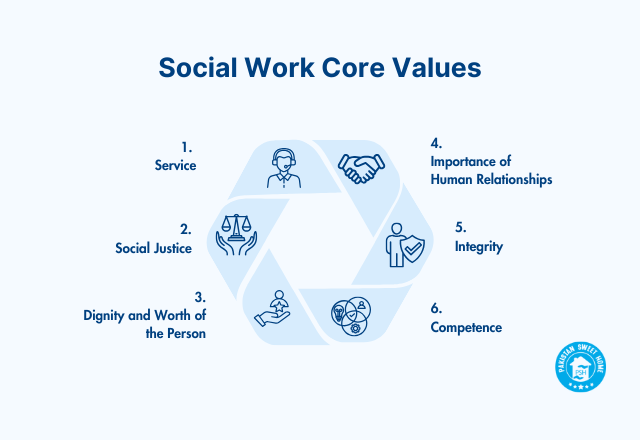Many people enter social work with passion, but struggle to stay grounded without clear guiding principles.
Without a solid foundation, even the most well-meaning professionals can face burnout, confusion, or ethical missteps. It becomes easy to lose direction when dealing with complex human needs, injustice, and overwhelming systemic issues.
That’s why understanding core social work values is not just helpful—it’s essential.
Let’s explore the values, history, key elements, reasons, and real-world impact of social work values.
History of the NASW Code of Ethics and Work Values
This section traces the early beginnings of ethical guidelines in the U.S. social work profession. It shows how the NASW emerged and began formalizing values to guide social workers.
- 1947: The American Association of Social Workers (AASW) ratified the first formal code of ethics.
- 1955: AASW merged with six other groups to form the National Association of Social Workers (NASW).
- 1960: The NASW created its first Code of Ethics, comprising 14 points that focused on helping people and improving society.
Major Revisions and Updates
Over time, the Code of Ethics was expanded and revised to meet the evolving needs of the profession. These revisions reflected broad ethical principles and ethical standards of social work.
- 1967: Introduced a formal commitment to nondiscrimination.
- 1979:
- Transitioned from a brief, bullet-style format to a comprehensive document.
- Added a preamble, 6 main sections, and 82 principles.
- Included enforcement procedures for ethical violations.
- 1993:
- Added guidance on dual or multiple relationships.
- First time the concept of social justice appeared in the code.
- 1996:
- The code has been expanded to include a "purpose" section following the preamble.
- Defined social justice as a core social work value.
- Finalized the modern format of the code.
Later Updates
This section highlights continued improvements in the code to address changing societal contexts. These include confidentiality, inclusivity, technology use, and self-care.
- 1999: Minor revision clarified aspects of confidentiality.
- 2006: The NASW Ethics Summit determined that no major changes were needed at the time.
- 2008: Nondiscrimination clause updated to include immigration status, sexual orientation, and gender identity.
- 2017: Added ethical guidance on technology, including searching for client information online.
- 2021: Revised to enhance language around cultural competency and emphasized the need for social worker self-care.
Context and Cultural Influence
The development of the NASW Code was influenced by larger cultural and political movements, including growing awareness of cultural and ethnic diversity. These shifts shaped the profession’s priorities and ethical concerns at different points in history.
- Professional identity efforts began after Abraham Flexner's 1915 speech, which questioned whether social work was a profession.
- 1950s–60s: McCarthyism led to clearer ethical distinctions between individual beliefs and organizational positions; civil rights movements pushed for inclusive language.
- 1970s–80s: The drop in public welfare and growth of private work followed changes in politics and the economy. The profession then focused more on ethics, like malpractice and risk.
- 1990s: The 1996 Welfare Reform Act changed social work to focus more on helping individuals instead of communities. Ethical rules started to look more like those in medicine and law, especially about responsibility and managing relationships.
6 Core Values of Social Work
Social workers devote their lives to helping others, striving to protect human rights and support those in need. The NASW’s six core values guide social work practice by helping social workers act ethically and fulfill their duties effectively.
Here are the six core values that shape the work of social workers.
1. Service
The heart of social work is helping others. Social workers use what they know to help people, families, and communities. They often put others' needs before their own. They aim to improve lives, and many even volunteer outside their regular jobs to offer extra support.
During the COVID-19 pandemic, many social workers helped by organizing food drives, giving out masks, and supporting their communities.
2. Social Justice
Social workers fight for fairness. They stand up for people who are treated unfairly or left out, like those facing poverty, racism, or homelessness. They work to make sure everyone gets equal treatment and access to resources. They think about their own beliefs and ask others to do the same, helping to build a society where everyone is treated with respect.
3. Dignity and Worth of the Person
Social workers respect each person’s unique background, culture, and way of thinking. They believe everyone deserves to be treated with kindness and value, no matter their situation. Social workers don’t force their opinions on others. Instead, they help people make their own decisions, focusing on what’s best for them and society.
4. Importance of Human Relationships
Relationships are key to healing and growth. Social workers help people create strong, healthy bonds with family, friends, or support groups. This can greatly improve their lives.
Especially during hard times like the pandemic, these human connections became even more important. Social workers help people strengthen good relationships and move on from harmful ones.
5. Integrity
Trust is everything in social work. Social workers must be honest, responsible, and live by the values they promote. By doing the right thing—even when no one is watching—they build trust with their clients and show what the profession stands for. Being honest and dependable helps them better support the people they help and the groups they work for.
6. Competence
Being good at their job means constantly learning and growing. Social workers must understand their strengths and know when to seek help or learn more. They should never pretend to know something they don’t. Social workers keep learning all their lives—through study, training, or real experience—so they can help people better.
Reasons for a Code of Ethics
The Code of Ethics helps set clear rules, policies, and expectations for people working in the field of social work. It also makes sure that anyone who breaks these rules can be held responsible.
This code has six main goals:
- Lays out the core values that form the foundation of the social work profession.
- Defines ethical standards that guide how social workers should behave and reflect those values in their work.
- Helps social workers make the right choices when facing tough or unclear situations.
- Sets rules that the profession can use to hold social workers accountable.
- Introduces the mission, values, and ethical standards to new social workers entering the field.
- Creates a way to evaluate whether a social worker has acted unethically. Those who agree to follow this code must also accept its rules and any actions taken if they violate them.
The National Association of Social Workers (NASW) encourages all social workers to keep these ethical goals in mind. At the same time, professionals should also rely on research, policies, and agency rules to guide their actions.
The Impact of Core Values in Social Work
When social workers follow their core values, they help more than one person—they improve whole communities and society.
Here’s how these values make a real difference:
- Core values create lasting change
When social workers follow their core values, they create positive change for both individuals and whole communities.
- Service builds trust and healing
By putting others first and offering dedicated help, social workers build trust with their clients. This support can help people overcome tough life situations and break free from harmful cycles.
- Fighting for justice brings fairness
Social workers stand up for equal rights. They work to make things fair, stop unfair rules, and give chances to people who are often ignored or treated badly.
- Respecting dignity empowers clients
When people feel respected, they’re more likely to believe in themselves and take charge of their own lives. Social workers help clients make positive changes that match their values and goals.
- Strong relationships create strong support systems
What social workers do goes beyond solving immediate problems — they understand that good relationships are key to lasting change. By helping clients build meaningful connections, they provide a support system that encourages long-term growth and success.
- Integrity and competence build trust
Being honest and skilled is essential for those who aim to become social workers, as it helps them earn the trust of clients and communities. This trust leads to better results and stronger social services.
- Learning and ethics drive real progress
Social workers are always learning and improving. Their dedication to doing what’s right helps them address social problems and make lasting, real changes for people and society.
Elements of the Social Work Code of Ethics
The Social Work Code of Ethics was created in 1960. It has been updated many times to stay useful, including a 2021 update about cultural awareness and self-care for social workers.
Below is a simple explanation of the key ethical standards that guide social workers.
Working with Clients Ethically
Social workers recognize that their most important duty is to put the well-being of their clients first. They should help clients make their own decisions and support their independence. Social workers should only work professionally with clients. They must get clear permission first and explain everything in simple, easy-to-understand words.
Clients should feel comfortable asking questions, and social workers must be honest about their education, training, and experience. They should only offer services they are properly qualified to provide. It’s also important that they avoid any situation that might create a conflict of interest or affect their professional judgment.
Respecting client privacy is a must, and confidentiality should be maintained when discussing personal information. Social workers must also make sure their service fees are fair and reasonable.
Respecting Colleagues and Collaborators
Social workers should treat their colleagues with fairness and respect. They must also keep any private or sensitive information shared by coworkers confidential. When working with professionals from other fields, everyone involved should clearly define their roles and ethical responsibilities.
If it helps the client, social workers should consult with other professionals. When talking about a client, only necessary information should be shared. Social workers should speak up if they see colleagues acting unethically and take action to stop it.
Professional Conduct at Work
When offering advice or support, social workers should be honest about what they know and what they’re qualified to do. Those pursuing a career in social work should only take on leadership or supervisory roles if they have the necessary skills.
Supervisors are expected to give fair and respectful feedback to those they oversee. The code also guides managing paperwork, maintaining records, fulfilling tasks, and meeting professional responsibilities.
The social work code of ethics is essential for all social workers and social work students, regardless of their role, the population they serve, or their work setting.
Being a Responsible Professional
Because social work is a challenging and evolving field, professionals must act ethically and represent themselves honestly. They are encouraged to keep learning, stay updated with new knowledge and skills, read professional materials regularly, and use critical thinking.
The code clearly states that discrimination of any kind is not acceptable. A social worker’s personal life should not interfere with their ability to do their job responsibly.
Upholding the Social Work Profession
Social workers promote and uphold high standards within the profession. They should work to support and strengthen the values, mission, and knowledge of social work. They’re also encouraged to assess and improve social work core values, policies, programs, and methods of practice.
Contributing to a Just Society
Social workers have a role in supporting the well-being of communities at every level — from local to global. They should continue to challenge social injustice, fight for basic human rights, and push for fairness, equality, and justice for all people.
In conclusion, Social work values are more than just ideals — they are the backbone of ethical and effective practice. The profession has six core values: service, social justice, and dignity and worth of the person. It also includes the importance of human relationships, integrity, and competence. These values guide social workers in every decision they make.
The NASW Code of Ethics was developed to protect and uphold these values. It provides clear direction, ensures accountability, and helps social workers navigate complex situations with professionalism. When these values are upheld, the results are powerful. They help heal individual lives and promote fairness and justice across whole communities.
By staying true to these values and the ethical standards that support them, social workers create meaningful change. The world needs their compassion, advocacy, and hope more than ever.
Pakistan Sweet Home stands as a true example of social work values in action. Through your orphanage donation, you help provide shelter, education, and hope to orphaned children. Support their mission and be part of creating a better future for those who need it most.
Let Orphans Feel They Matter

info@pakistansweethome.org.pk
(051) 4865856
+92 335 1118477









